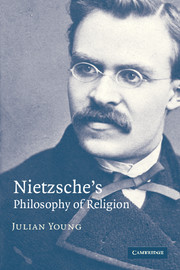Book contents
- Frontmatter
- Contents
- Acknowledgements
- List of abbreviations
- Introduction
- 1 Schopenhauer and ‘Man's Need for Metaphysics’
- 2 The Birth of Tragedy
- 3 Untimely Meditations
- 4 Human, All-too-Human
- 5 The Gay Science
- 6 Thus Spoke Zarathustra
- 7 Beyond Good and Evil
- 8 On the Genealogy of Morals
- 9 The Wagner Case
- 10 Twilight of the Idols
- 11 The Antichrist
- 12 Ecce Homo
- 13 Epilogue: Nietzsche in history
- Bibliography
- Index
1 - Schopenhauer and ‘Man's Need for Metaphysics’
Published online by Cambridge University Press: 27 October 2009
- Frontmatter
- Contents
- Acknowledgements
- List of abbreviations
- Introduction
- 1 Schopenhauer and ‘Man's Need for Metaphysics’
- 2 The Birth of Tragedy
- 3 Untimely Meditations
- 4 Human, All-too-Human
- 5 The Gay Science
- 6 Thus Spoke Zarathustra
- 7 Beyond Good and Evil
- 8 On the Genealogy of Morals
- 9 The Wagner Case
- 10 Twilight of the Idols
- 11 The Antichrist
- 12 Ecce Homo
- 13 Epilogue: Nietzsche in history
- Bibliography
- Index
Summary
Nietzsche describes Schopenhauer's The World as Will and Representation (1818), which he discovered in a second-hand book shop in Leipzig in 1869, as a book written especially for him (UM iii 2). The Birth of Tragedy he describes as written ‘in his [Schopenhauer's] spirit and to his honour’ (BT 5). Even after his break with decadent ‘romanticism’ represented, as he saw it, by both Schopenhauer and Wagner, he continued to regard the former, his ‘first and only educator’, as both a ‘great thinker’ and a great human being (HH ii Preface 1). Even in the middle of attacking everything Schopenhauer stands for, in On the Genealogy of Morals, Nietzsche still pauses to call him ‘a genuine philosopher … a man and a knight with a brazen countenance who has the courage to be himself, knows how to stand alone and does not wait for the men in front and a nod from on high’ (GM iii 5).
In this chapter I shall very briefly sketch Schopenhauer's general philosophy, acquaintance with which is necessary, inter alia, to understanding the development of Nietzsche's metaphysics, before turning to what Schopenhauer has to say specifically about religion.
IDEALISM AND PESSIMISM
The basis of all Schopenhauer's thinking is, as he understands it, Kantian idealism. The everyday world of space and time, a product of the way in which the human mind processes the raw material it has received from external reality, is, he holds, mere ‘appearance’ or ‘representation’, in the final analysis a ‘dream’.
- Type
- Chapter
- Information
- Nietzsche's Philosophy of Religion , pp. 8 - 13Publisher: Cambridge University PressPrint publication year: 2006



